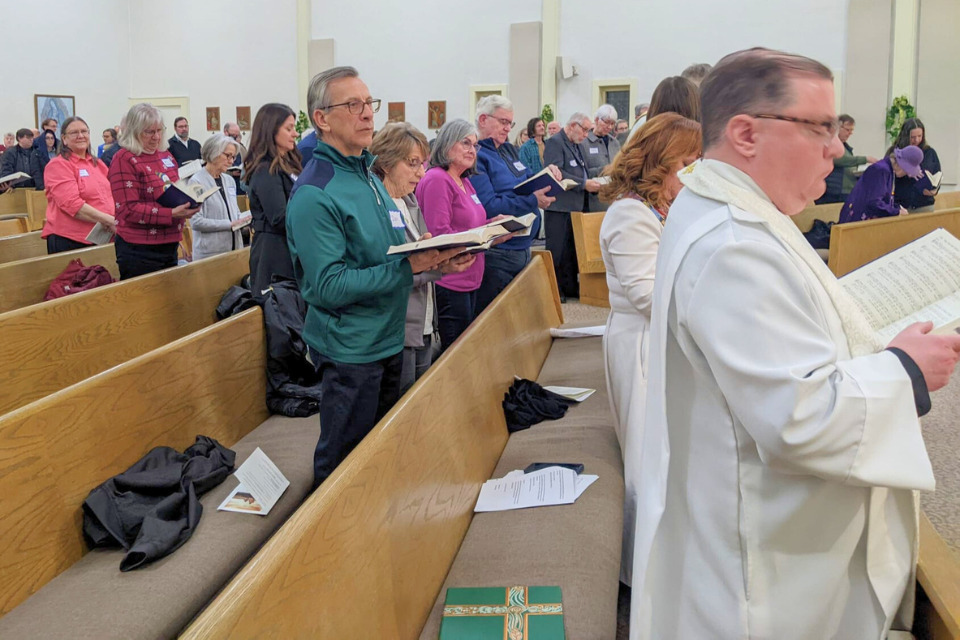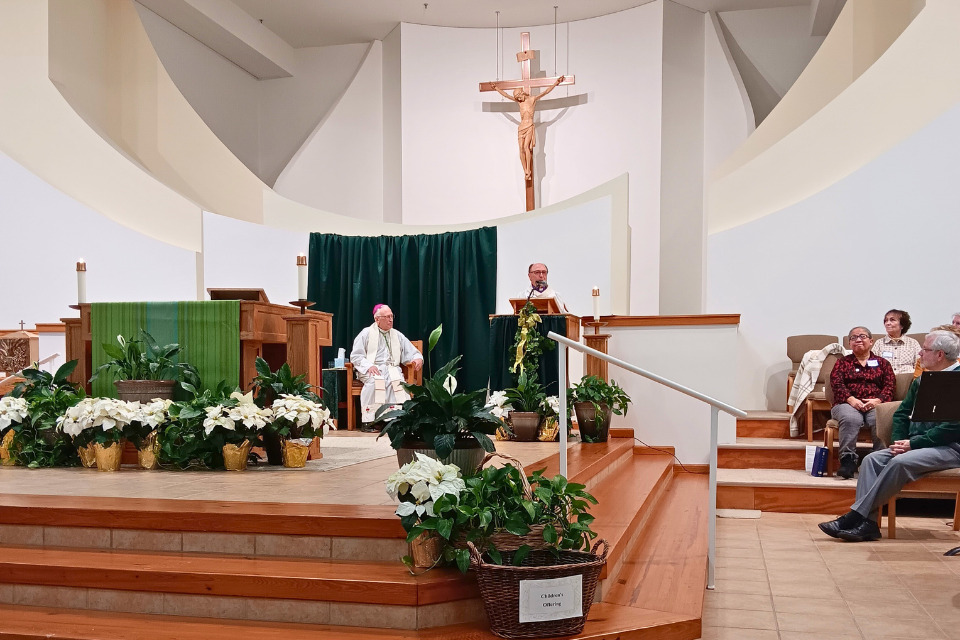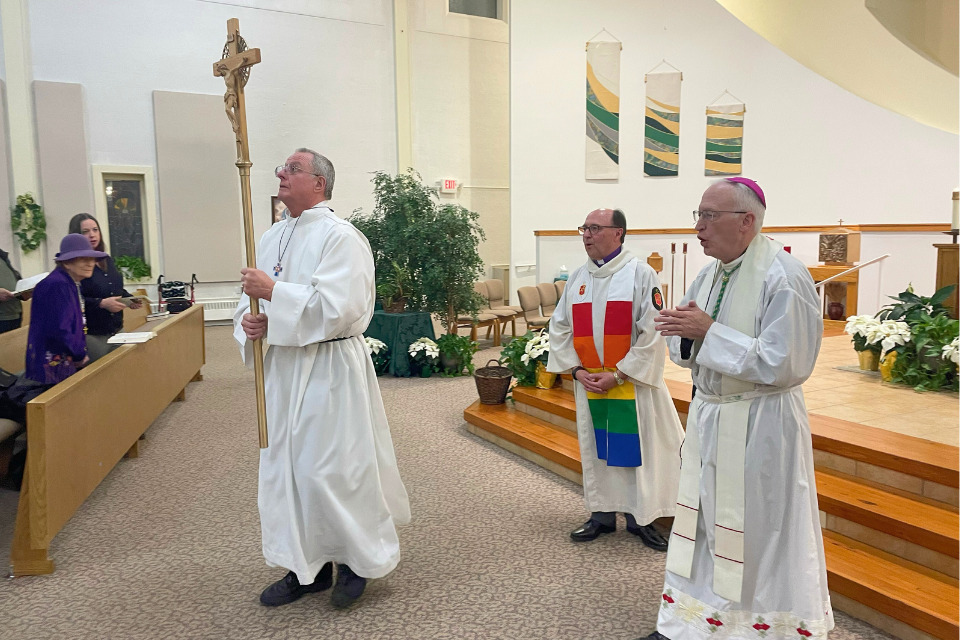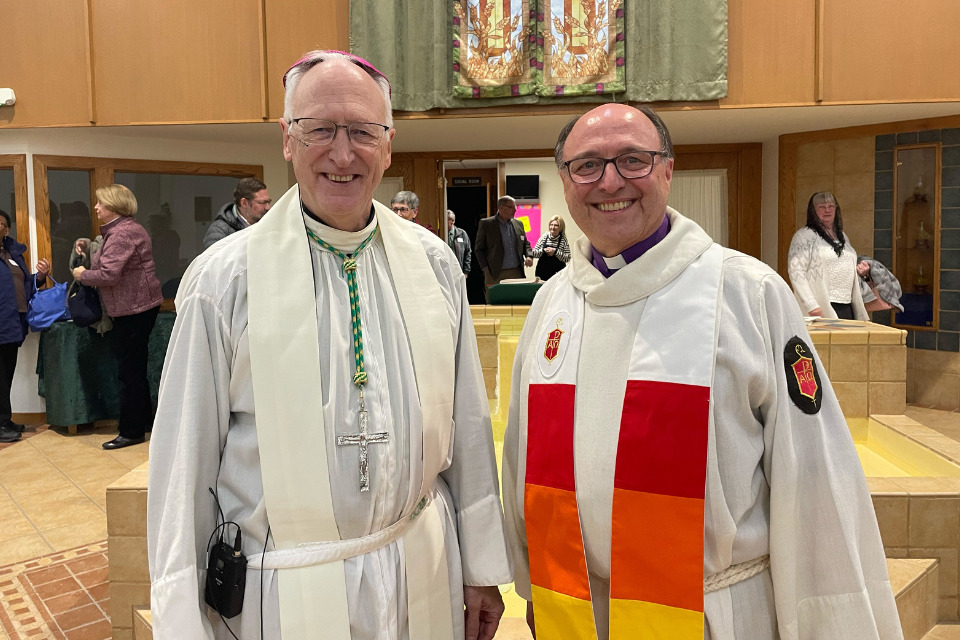United Methodists reflect on the benefits of and challenges to ecumenism following a recent prayer service in Lansing in observance of the Week of Prayer for Christian Unity.
JAMES DEATON
Content Editor
On Friday, January 19, 2024, Bishop David Bard co-officiated and preached at an ecumenical gathering of Christians at St. Thérèse of Lisieux Parish in Lansing. The Roman Catholic church opened its doors for prayer and fellowship in observance of the Week of Prayer for Christian Unity, held January 18-25 each year.
Several Michigan United Methodists were in attendance, including Rev. Melissa Claxton, pastor of First United Methodist Church of Warren, and Rev. Haley Hansen, associate pastor at The Peoples Church, a multi-denominational church with ties to four Protestant denominations. The Peoples Church is just off Michigan State University’s campus in East Lansing.
The Week of Prayer for Christian Unity was started over 100 years ago by Roman Catholics and later widened to include other Christians following the 1948 creation of the World Council of Churches (WCC), an ecumenical fellowship of over 350 churches across the globe. The WCC and partners now set the theme and provide congregational resources each year in several languages.
The United Methodist Church, through its predecessor denominations, is a founding member of the WCC. Even today, The UMC continues its ties to the WCC by promoting Christian unity and common missional objectives. Financial gifts through conference Ministry Shares help fund the Interdenominational Cooperation Fund, allowing The United Methodist Church to partner with other Christians to give witness to the common hope we have in Jesus Christ.
Over 125 people met Friday evening for the ecumenical prayer service hosted by St. Thérèse of Lisieux Parish. Fr. John Fain, pastor of St. Thérèse, is also the ecumenical officer for the Diocese of Lansing. Last summer, Fr. Fain contacted Bishop Bard, at the encouragement of his bishop, Most Reverend Earl Boyea, to see if he might be open to taking part in this prayer service as the presiding bishop of the Michigan Conference and a colleague in Christian ministry.

Over coffee, Fr. Fain and Bishop Bard discussed theological issues they agreed on, including a common concern for the environment as Catholics and Methodists. “But, I think more importantly than that, we talked about the idea of praying together,” said Fain. That’s what led to Fr. Fain inviting Bishop Bard to participate in this ecumenical prayer service.
Bishop Bard gave the sermon, and then Rev. Claxton and Rev. Hansen were invited to read scripture and offer prayers as part of the service. Bishop Earl Boyea also co-officiated with Bishop Bard.
According to Fr. Fain, prayer is a major unifying force among Christian traditions and something we should do often and together. “There’s a prayer that Jesus prayed at the Last Supper [in John 17], in which he stated his desire that his followers always be one and united. And I think that’s really what this [prayer service] comes out of,” says Fain. “But we’re not just praying for a harmonious relationship between denominations; that’s certainly very important. But we’re praying for that unity that Jesus talked about at the Last Supper — a real unity.”
Praying together as Christians from different paths and traditions gives a foretaste of what Jesus prayed for as he thought of his followers and desired peace and unity.
Bishop Bard, in his sermon, said that Christian unity is about neighborliness, picking up on the theme chosen for this year’s Week of Prayer for Christian Unity: “You shall love the Lord your God . . . and your neighbor as yourself” (Luke 10:27, NRSVue).
But he also noted that neighborliness and loving our neighbor is a challenge. Looking at the world today, we see failures of neighborliness among Israelis and Palestinians, in racist thoughts and actions, in neglecting to care for our planet, and in the deep polarization in our society.
So that God may create neighborliness within us, said Bishop Bard, we must engage in prayer, worship, and spiritual disciplines. We aren’t left on this journey alone. God’s grace and Spirit will give us courage and strength. This will help us complete our task as followers of Jesus: to bring neighborliness to this broken world.

Fr. Fain agrees that a lot can divide us as Christians and that we need the Holy Spirit to be that unifying force in our relationships. “Left to our own devices, we are probably going to fracture and divide,” he explains, “but God really will bring us together, bind us together. It’s a witness to the world, which is such a divisive place.”
But how can we be good news bearers of unity and neighborliness when hostile cultural and societal forces seep into our churches? Divisions within Christianity are real and painful, especially within The United Methodist Church as we emerge from the season of disaffiliation. We do not always treat each other with love, compassion, and understanding. We think we are the only Christians doing things right.
Rev. Melissa Claxton, a United Methodist pastor who also convenes the Michigan Conference Division on Christian Unity and Interreligious Relationships, believes Christians can work together despite the cultural forces seeking to keep us apart.
Rev. Claxton says we must first deal with whatever underlying emotions are preventing genuine relationships from forming, whether it’s fear, hurt, or grief. Those emotions are real, but we must work through them and trust the Holy Spirit to guide us as we fulfill our greater purpose. We can’t do our work alone; God’s work is bigger than us.
“Ecumenical collaboration allows us to pool resources,” says Rev. Claxton, “including time and energy, by creating a space where we can connect people to a ministry they are passionate about. Ecumenical ministry also allows us to learn from one another. I love that part of our stance as United Methodists: that we know that we don’t have God’s divine wisdom given directly to us. There is room to learn and grow in our faith and understanding.”
She has seen ecumenism work effectively in her ministry setting. She explains, “Every year, I partner with the Presbyterian church for the Blue Christmas service. It’s a ministry they are not only good at but passionate about. We worship with them. During Lent, we partner with the United Church of Christ congregation. They host the Maundy Thursday service, and we host Good Friday. We build relationships and learn from one another.”

Rev. Haley Hansen pastors a multi-denominational congregation in East Lansing affiliated with The Presbyterian Church (U.S.A.), The United Methodist Church, The United Church of Christ, and the American Baptist Church. This community has shaped her.
“Over and over again,” Rev. Hansen says, “I’m reminded that there’s always more that unites us than divides us. The Peoples Church exemplifies that ecumenism is difficult, life-giving, and sometimes messy work in which God never fails to show up. Despite our differences and the challenges of being a multi-denominational church, the Holy Spirit continues to move in this ecumenical experiment of a church.”
She says ecumenical work requires great humility, and when we approach it with humility and grace, it’s much easier to remember our common call to love God and neighbor.
Rev. Hansen explains further that she feels unity is possible for the greater Christian community despite division and polarization. Still, we have to be okay with being uncomfortable and disagreeing with one another. “The search for common ground,” she says, “is hard but holy work that demands a great deal of vulnerability and courageousness.”
The Lansing ecumenical prayer service, which celebrated the Week of Prayer for Christian Unity, ended with food and fellowship in the church’s basement. It was a fitting ending to an uplifting service honoring our unity in Christ.
“The fellowship time following the worship service was incredibly encouraging and meaningful,” says Rev. Hansen. “After meditating on the idea of being a neighbor through worship, we got the opportunity to actually practice being neighbors to each other through the breaking of bread. It was an important reminder of the necessity of embodying and practicing neighborliness.”
Last Updated on January 30, 2024

